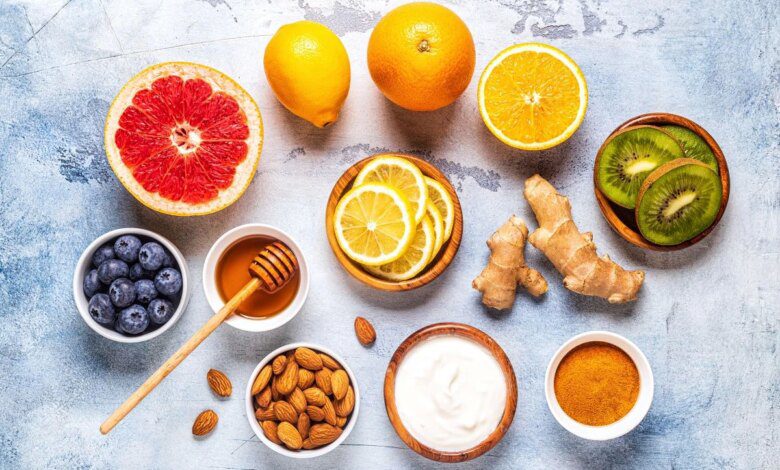
The best foods for immunity
Due to their richness in vitamins and minerals, fruits and vegetables should be consumed daily. Among their many benefits are those related to the immune system.
The content of the article
Citrus
We rush to take vitamin C supplements when we have a cold because the substance is known to be important in preventing or treating infections. Vitamin C helps increase the number of leukocytes involved in anti-infective defense. Get this vitamin from food, and the ideal source is citrus fruits - oranges, tangerines, grapefruits, clementines, lemons. Since the body cannot store it, it is beneficial to consume at least one food containing it daily. The daily requirement for vitamin C is 75 mg for women and 90 mg for men. If you choose supplements, avoid taking more than 2000 mg per day. Additionally, vitamin C can help with recovery from a cold.
Blueberry
A superfood with numerous health benefits, blueberries contain a special type of flavonoid, anthocyanins, whose antioxidant properties support immunity. A 2016 study found that flavonoids play an important role in maintaining immunity in the respiratory tract. Researchers have found that people who eat foods rich in flavonoids, such as blueberries, are less likely to get upper respiratory infections or colds than those who don't.
Black chocolate
Dark chocolate is not only delicious, but also very healthy. It contains theobromine, a compound that helps strengthen the immune system by protecting the body's cells from free radicals. However, it is recommended to consume it in moderation because, apart from the benefits, dark chocolate is rich in calories and saturated fat. 1-2 squares per day is enough.
Yogurt
A true ally of the immune system is natural yogurt. It is a source of probiotics, good bacteria that balance intestinal flora and play an important role in immunity. According to a 2018 study, probiotics improve the immune system by increasing the production of immune cells, strengthening the intestinal lining, and blocking the proliferation of harmful bacteria in the digestive tract. Probiotics have also proven effective in reducing the duration of acute respiratory infections in both children and adults. In addition, yogurt contains vitamins and minerals involved in supporting immunity, including vitamin B2, zinc, selenium and magnesium. Selenium and magnesium play a key role in the production of immune cells and can help protect cells from damage. Some studies suggest that zinc may help shorten the duration of symptoms of infections, including the common cold.
Almond
They are rich in vitamin E, which plays an important role in the proper functioning of the immune system. This vitamin is a powerful antioxidant and promotes the formation of red blood cells. To meet your vitamin E needs, you can eat 4-6 almonds per day.
Tomatoes
Thanks to their vitamin C content, tomatoes are another natural ally of the immune system. A medium-sized tomato contains more than 16 mg of vitamin C. A German study showed that vitamin C is important for phagocytes and T cells, important components of the immune system. Researchers have noticed that a deficiency of this vitamin weakens immunity and indirectly vulnerability to infections.
Eggs
Yolks, in particular, are full of compounds that stimulate the immune system. Eggs contain vitamin D, which is vital for regulating and strengthening the immune system. According to a study published in the journal JAMA, participants who took a daily dose of vitamin D during the winter were less likely to get a cold or any other upper respiratory tract infection compared to those who did not take the vitamin.
Fatty fish
It contains vitamins, minerals and fatty acids, compounds essential for the proper functioning of the immune system. Whatever form you prefer, fatty fish such as wild salmon (or mackerel, herring) are good to eat twice a week. Nutrients in salmon that support the body's natural defenses include vitamins B6 and D, magnesium, zinc and omega-3 fatty acids. It has been proven that zinc not only supports the immune system, but also speeds up recovery, for example, from a cold.
Olive oil
This oil helps support immunity due to its rich content of polyunsaturated fatty acids. A study published in the British Journal of Nutrition shows that increased consumption of polyunsaturated fatty acids from olive oil acts as an anti-inflammatory in the body. Research has shown that these acids help strengthen the immune system and protect the body from infections.
Broccoli
Considered a superfood, broccoli contains vitamins A, C and E, which protect white blood cells from oxidative stress. It also contains vitamin B9 (folic acid), a deficiency of which can affect the immune system. To preserve as many of the valuable compounds in broccoli as possible, it is recommended to cook it as little as possible (steaming is the ideal cooking method).
Carrot
Thanks to their beta-carotene content, a compound that the body converts into vitamin A, carrots should be consumed twice a week, especially during more severe periods or chronic illnesses, as they neutralize excess free radicals that attack white blood cells as well as other cells in the body. Carrots can be eaten as is or cooked.















